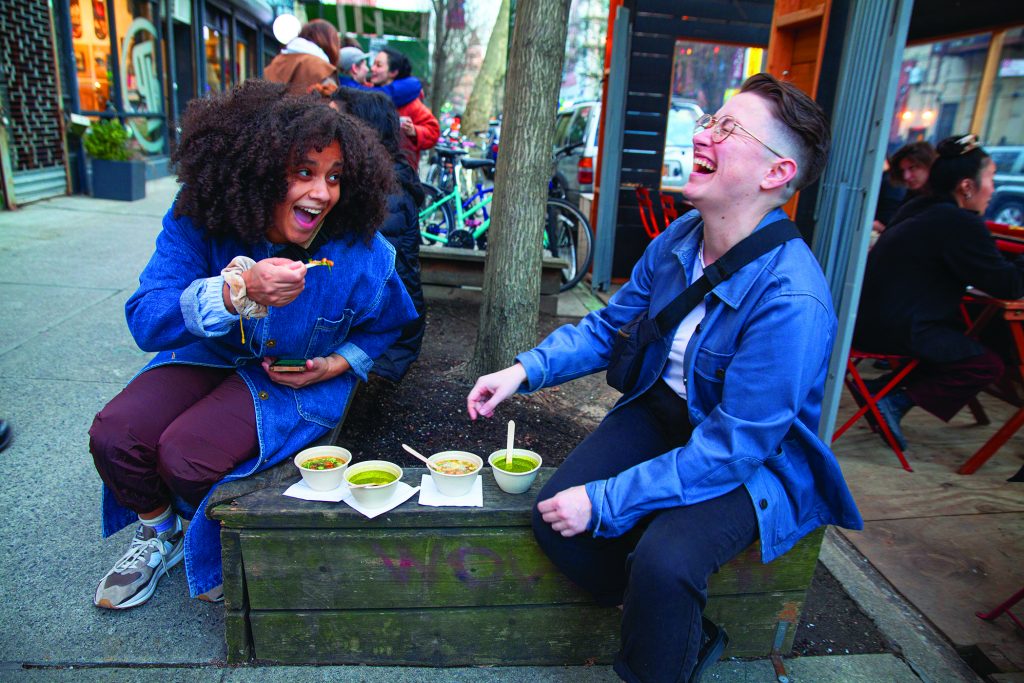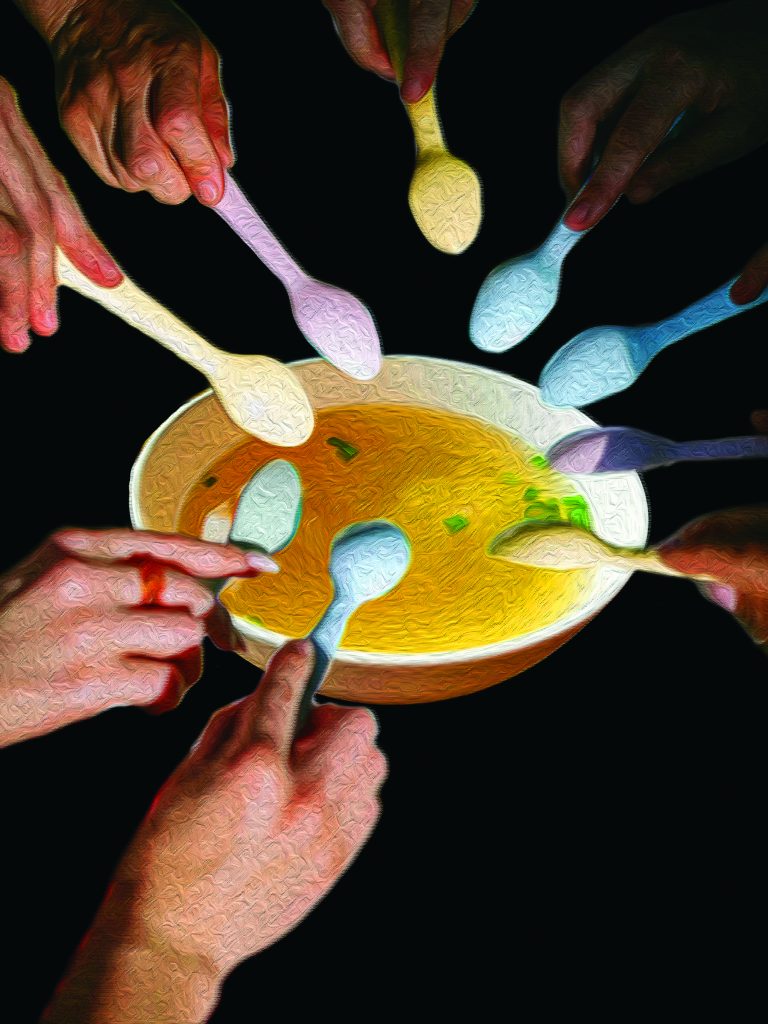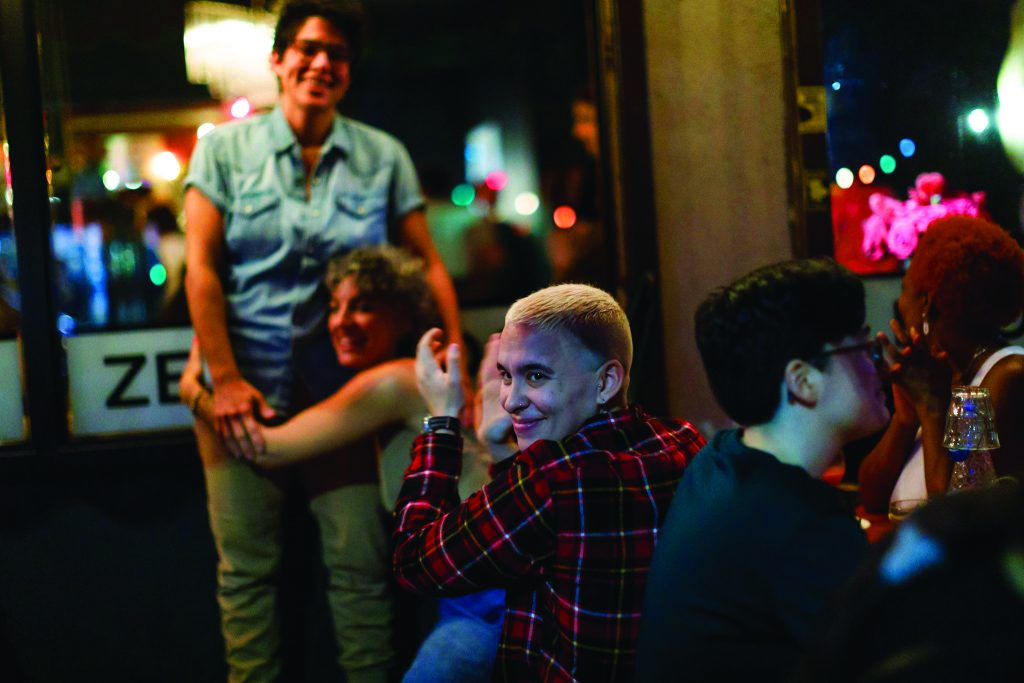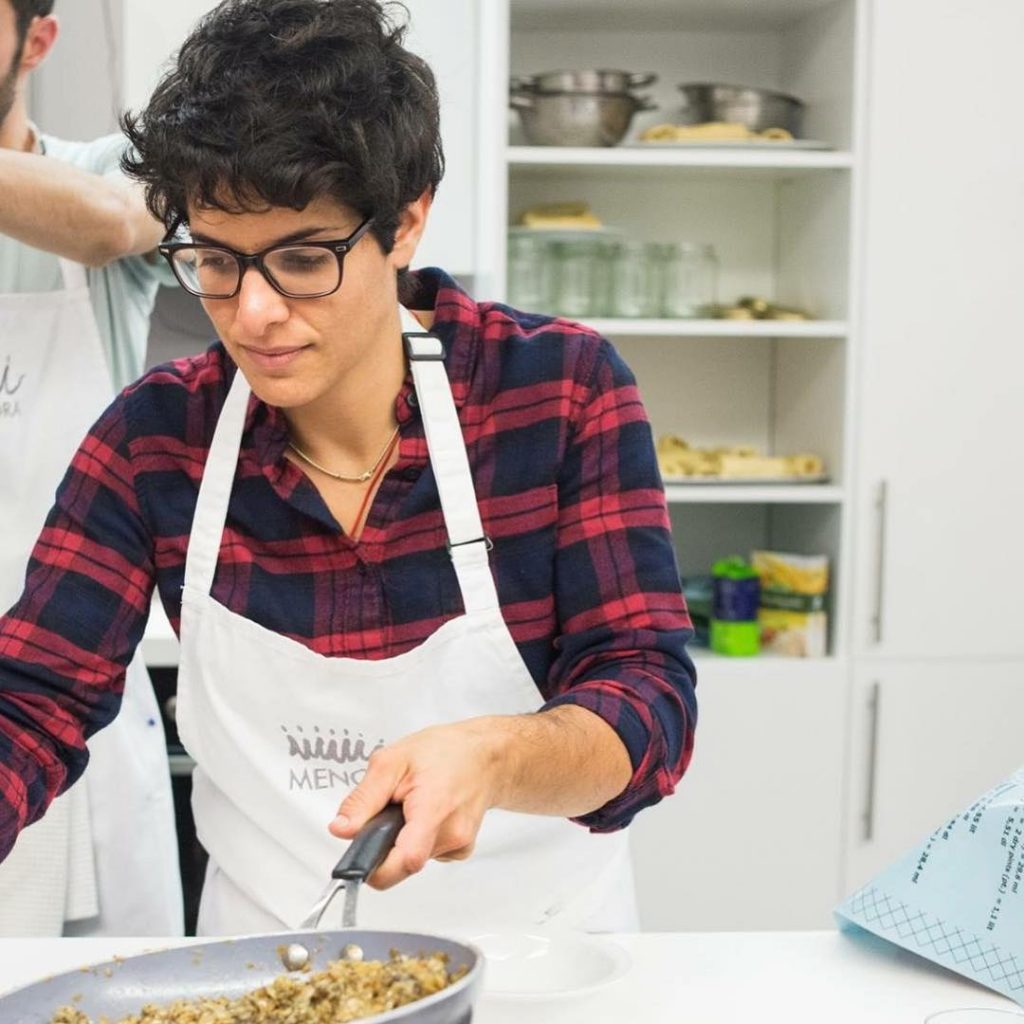Serving Solidarity in these Trying Times
In the wake of the 2016 election, Liz Alpern knew she needed to tap into the power of community and hosted the first ever Queer Soup Night. 8 years filled with countless bowls of warm meals coupled with tens of thousands of dollars in donations to local organizations, Queer Soup Night is a true testament to the expansive impact we can make when we gather together with spoons in hand and open hearts.

Earlier this summer, I had the opportunity to chat with Liz Alpern, chef and founder of Queer Soup Night, a project that was set in motion after the results of the 2016 election. I recently reconnected with her to catch up after the results of the most recent one. As we head into winter, and an unpredictable four years, I want to share our conversations with you. Liz’s words remind me of how soup can be not only a wholesome source of nourishment, but a form of solidarity, and how we have to keep showing up for our local communities now more than ever to collectively build the world we believe in. I hope these interviews bring you comfort like they did for me
Angela: Hi Liz, thanks for chatting with me today. One of the first things I learned about you was your passion for soup. Could you share more about why you love soup so much?
Liz: I’ve always had a passion for soup, almost comically so. I’ve always loved soup as a medium for sharing culture and stories and also comfort. And I love how playful the format is.
I always wanted to do something with soup, but I struggled to put my finger on what it was. You know, I work in food full-time and I cook and I do events, but I was like, “What’s compelling enough for people to come to a place for soup?”

How did the election in 2016 inform your thinking?
After the 2016 election, it became immediately clear that queer folks, LGBTQ folks, were feeling particularly vulnerable. Like, are all our rights gonna be rolled back? It’s almost hard to imagine how scary that felt.
There was a cafe that I was working in at the time, and the cafe owner mentioned to me that the space was free in the evenings if I ever wanted to do an event there. And the idea to take over this coffee shop and throw a soup party for queers kind of came together at that moment.
There was something that unlocked in my mind, like, soup makes sense to bring people together in this time of feeling vulnerable.
And how did that first event go?
It was a really great gathering. I made three soups with some help from friends, and friends of friends came. The energy was really amazing. We ended up raising a lot more money than I expected.
And it also happened to be the weekend – and this certainly couldn’t have been planned – when Trump had established all these travel bans for people coming from majority Muslim countries. And so people were coming from the airport after protesting at the airport and having a bowl of soup at the end of the day.
So it ended up being a really successful first event, and it was very clear that this was something we could replicate.
And now it’s in eleven (thirteen, as of November 2024) cities across the country. Can you talk about how you grew the organization?
We developed pretty slowly and with a lot of intention. The party first moved to another city because one of the founding people who’d been organizing, moved to a new city. So we tested the waters and did two events there.
Before long, a friend of mine who’s a chef out in Portland, Oregon, was like, I kind of love this idea. So the first two chapters in Gainesville, Florida, and Portland, Oregon were started by chefs I knew personally, who really took time to learn the model.
After that, we started getting contacted by people we didn’t know. That’s how lots of these things grow: they start with your network, and then they go one rung out at a time. And that was when we really had to establish what this was. You know.
what are the guidelines?
Could you speak more to the guidelines? For example, are non-queer guests allowed to attend or to cook?
The short answer is yes, anyone can attend. We have always had in our mission statement that all are welcome at Queer Soup Night.
We have this threefold mission, and it has been unwavering:
Strengthen your local queer community
Raise money for organizations in your place, and
Lift up the chefs in your place where you live.
At the same time, we definitely are not going out there looking for any chef. We really try to seek out queer chefs, but there have been plenty of instances over the years where someone who’s not queer-identified makes a soup. So I would say, 85% of the time everyone involved is queer, and there’s about 15% of people who may not be queer-identified, but are strong allies.

Bringing it back to the soup a little bit, I’m curious to hear what you think is the unique power of soup to express and also to connect.
No matter what culture you’re from – whatever your background is, whatever your story is, however you were raised – you are going to associate soup with comfort, with really deep nourishment, and with a feeling of home.
I’m an Eastern European Jew and I love matzo ball soup and chicken soup. They call it Jewish penicillin. But through Queer Soup Night, we’ve had Mexican chicken soup. We’ve had Vietnamese chicken soup. We’ve had Filipino chicken soup. We’ve had Korean chicken soup. We’ve had so many different versions of the same theme, right?
And the theme is, hey, this is what I’m going to serve you and it’s going to feel really good. It’s going to make your house smell like comfort and it’s going to stick to your clothes in a good way.
What has been your experience of being able to feed people such nourishing food?
You know, we’ve been doing Queer Soup Night for eight years, and I have never made money off of it. It’s purely a passion project for me; seeing people feel nourished by the food that we make for them is extremely motivating.
One of the things that I really like about Queer Soup Night is that it gives you an automatic inroad to chat with other guests. Soup is much more relatable than a lot of foods and easier for people to talk about, even if they’re not culinary minded. So I would say another part of the reward is just seeing other people be involved in conversations around soup. And that is another layer of nourishment, the connection.
Could you talk a bit about the collective impact that you’ve had on local grassroots movements here in New York?
Just in the last six months, we raised funds for more than 15 different local organizations. And I would say collectively, probably somewhere around $20,000 just in the last six months.
We raised over $50,000 in total in 2023. And that came from thousands of donations that were $12. That’s the kind of thing that I think of as collective impact – that you can show up to an event and pay $12 to $20. And then when it comes to the end of the year, this collective queer community has raised over $50,000 for different organizations.
And we select organizations that could really use a small amount of funding, where $500 to $2,000 would make a huge difference.
What kind of initiatives do the recipients of the donations revolve around?
Our only criteria is that they have to be local. We don’t send funds outside of the community. So your $12 stays right in your community.
Now we are defining “community” by geographic boundaries and you could definitely say that community is so many different things, but our goal with Queer Soup Night was always to build something that strengthens IRL connections.
I really admire the focus on the local.
I will tell you, it’s not always easy to restrain yourself, because there are so many places that our money needs to go. But especially when our eyes are on global events unfolding, it is so important to remember all the work that’s being done locally.
Like we, as an organization, basically started during the (2016) Trump presidency out of outrage and fear and concern and resistance. But we always said, “This party is not going to become irrelevant when Trump is no longer president.” There were a thousand things we were activated about before, and there are a thousand things we’re going to be activated about.
When Biden became president, no one was like “I think we’re just going to chill.” And look at where we are in 2024 facing another.

